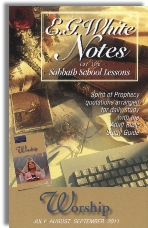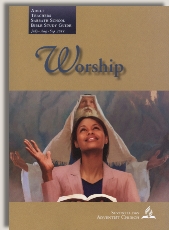|
||||||||||||||
Commentary on "Worship in the Early Church"
Day 1: Sabbath Afternoon, September 10, 2011 - Introduction
Overview
This quote taken from today’s quarterly lesson reveals the intended emphasis on worship in the early church:
“If I speak in the tongues of men and of angels, but have not love, I am only a resounding gong or a clanging cymbal” (1 Corinthians 13:1, NIV).
There is no reason to argue against love as the basis for worship; however, the passage from which this is drawn is not about a "worship service" specifically but rather about the value and use of Spiritual Gifts. Love should be our driving reason for worship and our love should guide us in how we worship together. But we must also take care that we do not gloss over serious errors in doctrine and practice in the name of being loving to one another. If anything, true love requires that we speak up regarding the dangers of false teachings and practices.
Observations
The lesson makes a couple of excellent points, drawing from Acts 2:41 it concludes that "This text alone shows the fallacy of the idea that all Jews rejected Jesus." This concept could be supplemented further looking at Romans 11:1-6:
1 I ask, then, has God rejected his people? By no means! For I myself am an Israelite, a descendant of Abraham, a member of the tribe of Benjamin. 2 God has not rejected his people whom he foreknew. Do you not know what the Scripture says of Elijah, how he appeals to God against Israel? 3 “Lord, they have killed your prophets, they have demolished your altars, and I alone am left, and they seek my life.” 4 But what is God's reply to him? “I have kept for myself seven thousand men who have not bowed the knee to Baal.” 5 So too at the present time there is a remnant, chosen by grace. 6 But if it is by grace, it is no longer on the basis of works; otherwise grace would no longer be grace. (ESV)
The lesson also makes a good point when it states the early church struggled with some of the same issues that we still struggle with today.
Corinth |
Galatia |
Philippi |
Colossae |
Thessalonica |
Ephesus |
Crete |
Jerusalem |
|---|---|---|---|---|---|---|---|
Divisions/ |
False gospel |
Libertines |
Off shoot Jewish philosophy |
Errors regarding the end-times |
Emphasis on Jewish laws |
Emphasis on Jewish laws |
Favoritism for wealthy |
Abuse of sacraments |
Emphasis on Jewish laws |
Emphasis on Jewish laws |
Asceticism |
Asceticism |
Jewish myths |
||
Disorderly worship |
|||||||
Theological errors |
|||||||
Moral laxity |
|||||||
Asceticism* |
*Asceticism is the idea that a person attains a higher spiritual or moral state through denying themselves certain foods, sexual relations, and other common desires or pleasures of life.
This day's lesson did introduce one common type of error, where we read and understand historical passages in light of today's practices; specifically, the statement that Peter made an "altar call before a multitude of Jews". The lesson, quite understandably, didn't cite any specific verses when referencing this altar call. Historically, "altar calls" began in the 18th century and took hold as a common evangelism tool in the revivals of the 19th century. Seventh-day Adventism emerged from this 19th century revivalism environment, so it isn't surprising that the church would view their own history as typical of church history throughout time. Unfortunately this practice leads to inserting contemporary traditions backwards into Scriptural passages, distorting our understanding of the original passage. The passage itself shows something quite different than an "altar call". Those who heard the message asked Peter what they should do, Peter wasn't calling on them to raise their hands or to walk forward or any other such call for action. Let's look at Acts 2:37-38 to see how Scripture describes the event.
37 Now when they heard this they were cut to the heart, and said to Peter and the rest of the apostles, “Brothers, what shall we do?” 38 And Peter said to them, “Repent and be baptized every one of you in the name of Jesus Christ for the forgiveness of your sins, and you will receive the gift of the Holy Spirit. (ESV)
Why even mention such a seemingly small departure from the Scriptural account when it has no direct bearing on the conclusions of the lesson? Isn't that just nit-picking? It is important because it cuts to the heart of how we study Scripture. Exegesis reads what is in Scripture and draws out of the passage what we can learn from Scripture. Eisegesis inserts our ideas and practices into the passage. When we practice exegesis we conform ourselves to the Word of God, when we practice eisegesis we are subtly transforming the Word of God into our image.
Summary
The quarterly lesson begins on a strong note. The Memory Text, while not specifically addressing worship, certainly has implications for worship. The key point of the day was that the early church went through struggles with doctrine and worship and that some of these struggles are the same ones we face today. Technologies may have changed greatly. The specific cultural contexts may have changed. But man's heart remains that same and as a result the issues addressed with the early church in Scripture are as relevant today as when they were written.
Copyright 2011 BibleStudiesForAdventists.com. All rights reserved. Revised August 22, 2011. This website is published by Life Assurance Ministries, Glendale, Arizona, USA, the publisher of Proclamation! Magazine. Contact email: BibleStudiesForAdventists@gmail.com.
The Sabbath School Bible Study Guide and the corresponding E.G. White Notes are published by Pacific Press Publishing Association, which is owned and operated by the Seventh-day Adventist church. The current quarter's editions are pictured above.
Official Adventist Resources
Standard Edition Study Guide Week 12
Teacher's Edition Study Guide Week 12
Easy Reading Edition Study Guide Wk 12
Search the Complete Published Ellen G. White Writings
Please Support This Project


